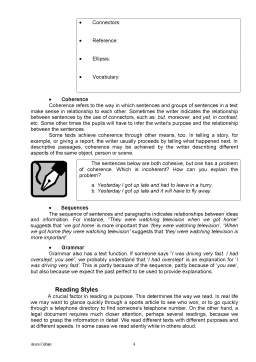Extras din curs
PUPILS, TEACHER AND SCHOOL
Establishing a productive learning environment is a big challenge for teachers. For beginning teachers, it may be the primary concern. Studies show that nearly half of the teachers who leave the profession during the first three years do so because of problems with managing pupils.
This unit and the next will help you establish and maintain a productive and orderly learning environment, i.e. a classroom that is safe, orderly and focussed on learning. Such an environment will enable your pupils to feel safe and to learn as much as possible. Their shared classroom routines, values, expectations, learning experiences, rules and procedures will increase their engagement, their sense of autonomy and will enhance the use of instructional time. All this will result in their improved achievement and motivation and in your job satisfaction.
After you have completed the study of this unit, you should be able to:
- explain how you can enable your pupils to learn English more happily and effectively
- describe how the class atmosphere can assist language learning
- identify the qualities of a good learner of English
- identify essential teaching skills that help promote learning
- identify the talents and skills of a good teacher of English
- explain how creating and teaching rules can eliminate management problems
1 Learning English Inside and Outside the Classroom
Throughout the world, the majority of English language learning takes place outside the classroom. Learners are exposed to English in the course of their everyday life: they interact with other English speakers, listen to the radio and TV, read newspapers, write letters, socialize, etc., in a word, they do things with English.
However, formal classroom learning may suit better some kinds of learners. These prefer that the responsibility of learning be taken away from them. In the classroom, frequency, pace and order of exposure to English is determined by a syllabus and/or a coursebook, and the teacher determines the learning activities. The control by the teacher of the organization of the classroom provides support to the learners lacking in motivation or confidence. Nevertheless, the same control may be a source of frustration to other learners, who know both what and how they want to learn.
As an English teacher, you must bear in mind that you are responsible for the learning of all pupils within the classroom. You must also train them in good strategies to enable them to continue learning outside the classroom. You must develop in them pupils habits of independence and autonomy, preparing them to organise their own learning and to exploit other sources of language outside the classroom.
2 The Complexities of the Classroom
Classroom activities have characteristics that make them complex and demanding:
o Several activities and tasks occur at the same time. When you teach a classroom, you need to maintain order, attract and keep your pupils’ attention, and keep them involved in a learning activity (individual, whole class, small groups, pairs). You may also have to deal with discipline problems.
o The events occur rapidly. Things happen quickly and you need to make many of the decisions right now. This need to make quick decisions can be almost overwhelming, particularly for beginning teachers.
o Events often take unexpected turns. You must always plan your classroom activity, and try to anticipate as much as you can of what will happen. And yet it is impossible to plan for all of your pupils’ responses. Pupils and classroom activity are often unpredictable, but experienced teachers get used to expecting the unexpected. The unpredictable nature of classrooms increases their complexity and challenge.
o You teach in front of people. In a sense, you are on a stage and your successes and mistakes occur in the public space. The pupils’ (and possibly other observers’) perceptions of your actions can have unintended consequences.
3 Getting to Know Your Pupils
To be able to predict as much of the unpredictable as possible, you need to know your pupils and to build up a wide repertoire of skills and techniques. All these will enable you to develop useful structures and a personal style of teaching. You will then maximize both your pupils’ potential and your own in the limited time and with the limited resources of the school.
In an ideal classroom, management is invisible. The atmosphere is calm, movement and interaction are comfortable, and pupils work quietly. The teacher gives few directions and reprimands pupils infrequently. In the real world, some classes are tough to manage. In most instances, however, a teacher can create an orderly classroom. Doing so requires good knowledge of the pupils and careful planning. It also requires the existence of a clearly understood and consistently monitored set of rules and procedures that prevents management problems before they occur.
Before planning rules and procedures, you must consider both the characteristics of your pupils and the physical environment of your classrooms. The relationship among these factors is illustrated below.
(after Paul Eggen and Don Kauchak 2004 Educational Psychology, Pearson)
The complexity of a teacher’s activity is especially apparent in the large classes of the primary and secondary schools, where the number of pupils and their immaturity combine to put to constant test the teacher’s classroom managerial skills. In such a context, knowing your pupils and knowing how to approach them is crucial.
Preview document
Conținut arhivă zip
- Metodica Engleza
- Methodology 2 Pupils, Teacher and School.doc
- Methodology 5 listeningcomprehension.doc
- Methodology 6Speaking.doc
- Methodology 7Reading.doc
- Methodology 8Writing.doc
- Methodology 9Teaching Vocabulary.doc
- Methodology3 Classroom Management.doc






























































































































